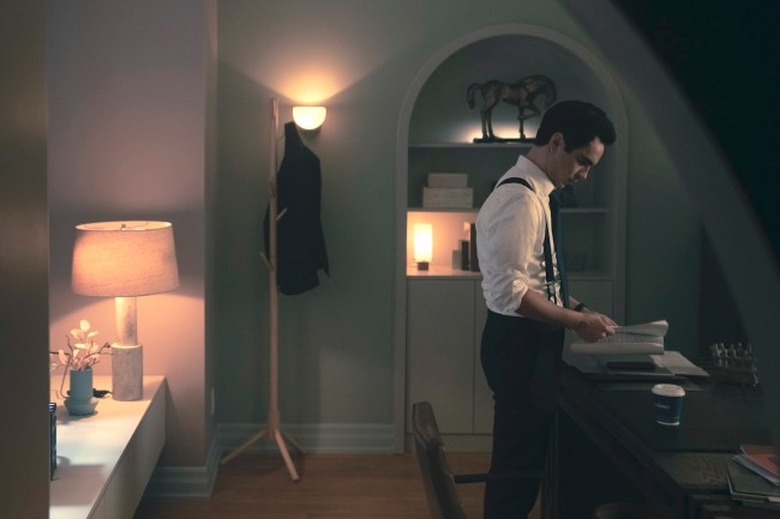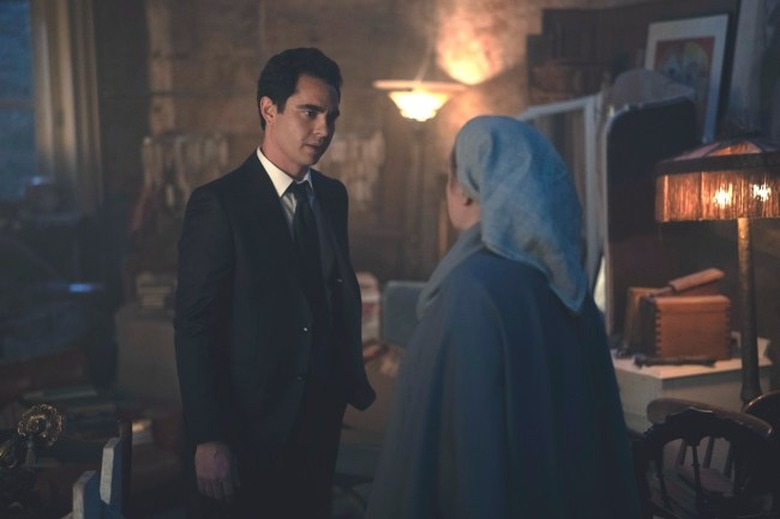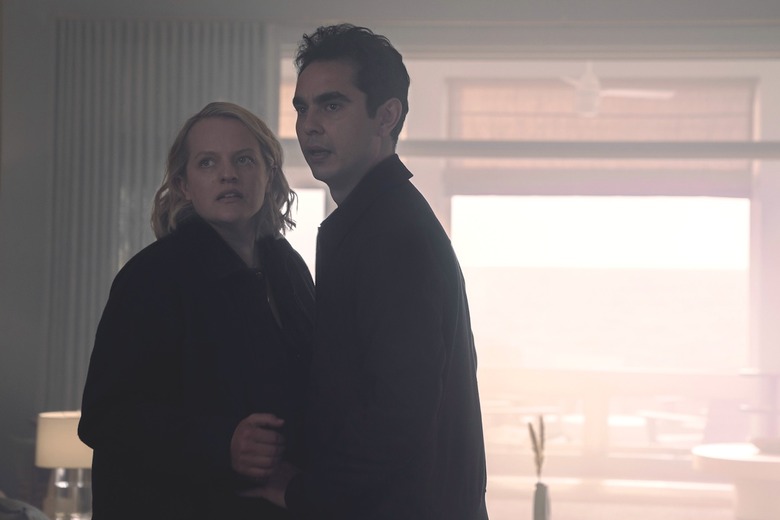The Handmaid's Tale's Elisabeth Moss, Max Minghella Unpack The 'Divisive' June/Nick Ending To Episode 6
Warning: This post contains spoilers for The Handmaid's Tale Season 6, Episode 6. Proceed accordingly.
June and Nick 'shippers, you OK?
We'd understand if you're not. After all, the latest The Handmaid's Tale episode ended with a gigantic betrayal: While Nick and June hid in a closet at Serena's house, they overheard High Commander Wharton tell his fiancée that he'd shut down Jezebel's after learning of an imminent Mayday attack. His source for the top-secret information? His son-in-law, Nick, in whom June had confided the plan earlier in the hour. (Read a full recap here.)
As the camera zoomed out on June reacting to Nick's stunning treachery, we wondered what it was like on the other side of the camera. So, in separate interviews, we chatted with Elisabeth Moss and Max Minghella for their take on what Nick did — and what it means as the Hulu series moves toward its grand finale.
TVLINE | For Episode 6, did you guys shoot new of Nick and June in his apartment at the Waterfords'?
MAX MINGHELLA | We did, yes.
TVLINE | What was it like to go back to that era of him, years later?
MINGHELLA | It was really fun to do. I love the concept for the scene when I heard about it. Selfishly, I love that apartment that Nick had in Season 1. So I was happy to go and revisit that set, and I thought it was a lovely scene. I'm always happy to do a scene with Lizzie.
TVLINE | I loved when they were talking about what his life was like before, and you have a line that's something like, "I wasn't anyone before this." I feel like that conversation illuminates why he has stayed in Gilead for such a long time, even though he's helped others get out. What do you think about that?
MINGHELLA | I think that, basically until Season 6, his primary motivation for staying in Gilead is access to June and the ability to help her. He's somebody prior to this, though, who didn't have any education, or sense of purpose, or any role models of any kind. There's no structure in his life. So I think a huge amount of, like you said, I think what's in the DNA of who he is is somebody who doesn't have any of that on his own, and I think that he would be quite lost without this frame of reference. It is all he knows at this point.

TVLINE | His relationship with High Commander Wharton this season: Granted, he's Nick's father-in-law. But Wharton has seemed to shape a lot of what Nick does in a way that other commanders' influences over him in the past has not.
MINGHELLA | Yeah, I'm happy you said that. I mean, I feel like he gets the most indoctrinated this year, primarily because of his relationship to Wharton, and I don't think he's ever had a paternal figure before who didn't have an obvious vulnerability. [Chuckles] You know, basically it's Waterford, and then Lawrence, and these are both guys who I don't think make him feel particularly safe.
And there's something about Wharton, who I think is a quite a misguided character but gives him a security he hasn't had before. If you look in the real world, I think a lot of the times when people get caught up in something like fundamentalism, a lot of the times it's because they lack a strong father figure.

MAX MINGHELLA
TVLINE | I want to talk about the scene in the closet. When we find out what Nick did, it breaks my heart. Tell me your first thoughts when you found out he'd go through with that level of betrayal.
MINGHELLA | You know, I don't think any of us expected to be doing this show for six seasons, and I don't know if I'll ever get to play a character again for this long. The privilege of it is, you get to explore so many facets of the character, and I think that that's kind of an amazing thing. I've really gotten to dig into who Nick is. Nick's been put through so many different circumstances, and I've gotten to experience all of that stuff with him.
I don't have an investment, really, in him being heroic. I have an investment in him being interesting and complex. So, I thought that the season is full of complexity for the character.
TVLINE | You don't have an investment in him being heroic, but I do!
MINGHELLA | [Laughs] Well, I think to that point, I'm conscious of the fact that it's probably gonna be pretty divisive. And I was impressed that Hulu stood by the writers, clearly, and supported them making certain creative decisions this season that I recognize may not be popular.
Once again, I think the show investigates a lot of different parts of the human condition in a way that is pretty special and unique to the show. And I like that about it. This feels very organic to that.
TVLINE | When Nick comes to June, right before the reveal, and says "Come with me to Paris," it's the most unhinged we've seen him in a long time — maybe ever. Take me through it. Does he actually think this plan has a chance?
MINGHELLA | No. He's in a moment of hysteria. I mean, even in the scene with Wharton, where he reveals information that we don't want him to, it isn't calculated. It's really him in a moment of desperation, trying to figure out the best way to handle something earnestly and not coming up with the answers and making the wrong choice. But it's not a considered decision.
I think, like, we all want people to believe that our favorite characters on TV are going to behave perfectly all the time, but none of us do. And sometimes, if you put a gun to somebody's head, they're going to do something stupid. I think most of us are kind of capable of cowardice, you know.
TVLINE | Is June tempted to go with him?
ELISABETH MOSS | Paris is always tempting. [Laughs] Yeah, it definitely is, especially if you're in love with the person — which she is, you know? She does love Nick, but you don't always fall in love with the right person. And unfortunately, Nick is in a position — I mean, look. I can defend him as a director and as storyteller. I can defend him. I think it's complex. I think that I don't know if he has a choice in the end, but again, you always have a choice, right?
He is in a place where he makes the wrong decision, but I also think that there's a way of looking at it, that other characters [will] point out to June that she should have seen this coming, that it's been coming for a long time, that Nick has never quite been fully honest about whose side he's on. He's never said that he was part of the resistance. He's never said that he was going to bring down Gilead. He's only ever said that he loves June, so that's the only truth he's ever spoken about it.
TVLINE | From a practical standpoint, Nick was June's ace in the hole in Gilead, and he's no longer a trusted source. Do you think she's at the point yet where she's thinking about how losing his connection could put her further away from finding and freeing Hannah?
MOSS | I don't know if she is that analytical about it yet... You may have had experiences with this on a smaller level, obviously not like quite this big of a betrayal with these kinds of stakes, but I think some of us have had that moment where something happens with somebody and you can't unsee it, you can't forget it and you can't move on. When she realizes in that closet what he's done, she can never go back. And it doesn't mean she doesn't love him, but she can't go back to before she knew that and knew what he did. It's too big of a betrayal, you know?
I don't think she's being analytical about it yet. It's too fresh, you know what I mean?
TVLINE | If Nick ever considered that June would find out so quickly, I can't imagine that he thought he would be right next to her when that was happening.
MINGHELLA | No, no.Of course not. I think that's what the show does really well, when it leans into melodrama in that way — for me, anyway. You know, we get associated sometimes with intellectualism, but I think the strength of the show is: It's kind of a great soap opera.
